How Often to Feed a Black Goldfish
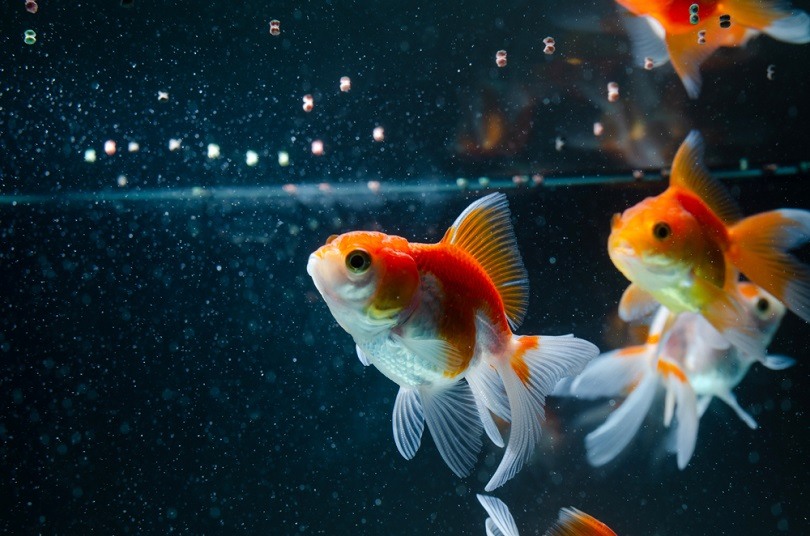
I get this question a lot: "How often should you feed your goldfish?"
And: How much should you be giving them each serving? Most importantly: What exactly do you feed anyway? Here's the brutal truth about feeding your goldfish: there is WAY too much confusion surrounding what kind of food is best and how much of it should be given each day. Some say, "just feed the fish when it looks hungry." If only it were that easy…
If you're serious about making sure your goldfish is healthy, you need to be very careful with exactly what and how much you are putting in the tank. Otherwise, you can end up causing your fish lasting damage (or even death).
Well, today I'm going to show you the formula that will push you further along towards having healthy fish and a stable aquarium for years to come.
Keep reading to learn how…

The Fail-Proof Feeding Formula (for Savvy Fish Owners)
There are 3 steps to this technique.
Steps
Step 1: Craft a digestive-friendly diet
Step 2: Know how much to give them
Step 3: Stick to the routine
Here's why this method works (and why it will make your life so much easier): It takes all the guesswork and uncertainty out of mealtimes. All of a sudden YOU have the power of knowing exactly what to do and how to do it.
You won't be just hoping you're feeding your fish properly… you'll know you're feeding your fish properly!
How Often Do You Feed Goldfish?
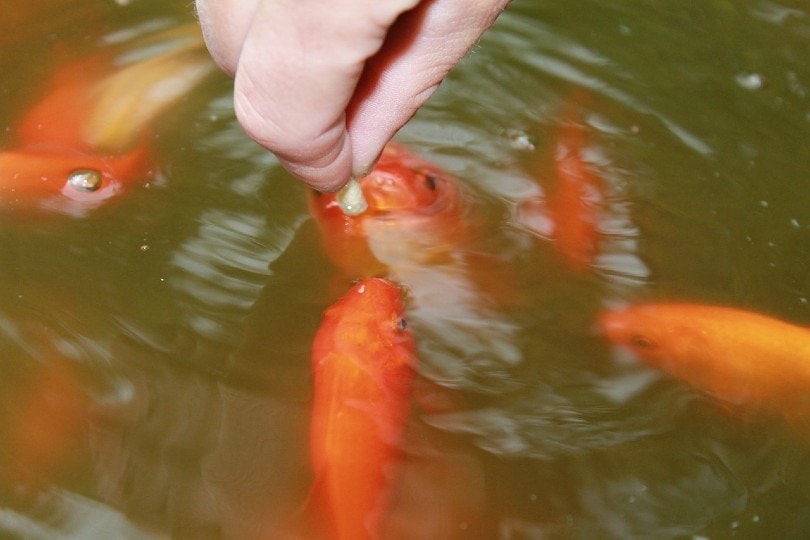
I get this question a lot from owners, and unfortunately, It isn't a black-and-white answer. Feeding frequency depends on a number of factors:
- How old your goldfish are
- If you are trying to condition for spawning
- If you are trying to get your fish to grow faster
- The temperature of the water
- The number of fish and/or size of your pond or aquarium (stocking volume)
In general, I recommend feeding your fish only once per day, ideally at the same time every day. However, these other factors play an important role in how often to feed goldfish.
Age of the Fish
Young fish need several frequent meals per day, as a goldfish grows the fastest in the first year of its life. Several small meals throughout the day promote more growth than one big one.
Spawning
If you are trying to get your fish to spawn, it is usually necessary to put them into "breeding condition" by feeding them several larger meals per day (this is accompanied by a more intense water change schedule). The greater amounts of food help the fish to produce more eggs and milt.
Growth
Are you trying to promote lots of growth in your fish? Maybe you want to see them get huge? In that case, more frequent feedings in smaller amounts are the way to go.
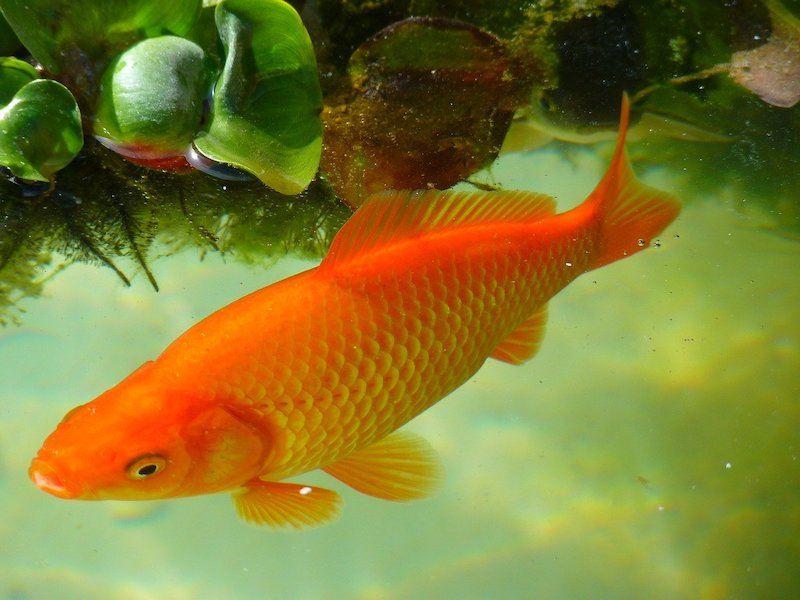
Temperature
During the wintertime outdoors when the temperature drops below 50 degrees F, many times goldfish only need to be fed once per month. Hibernating goldfish hardly digest food as their metabolism slows down, and the food can end up just rotting in their gut and leading to sickness.
Water Volume (Stocking)
How often to feed goldfish is also influenced by the water available to dilute toxins produced by excess nutrients. In a more crowded environment or one where there is not as much water volume to dilute the fish waste, sometimes a twice-a-week feeding is a good idea to prevent the water from getting fouled.

How Much to Feed a Goldfish at a Time
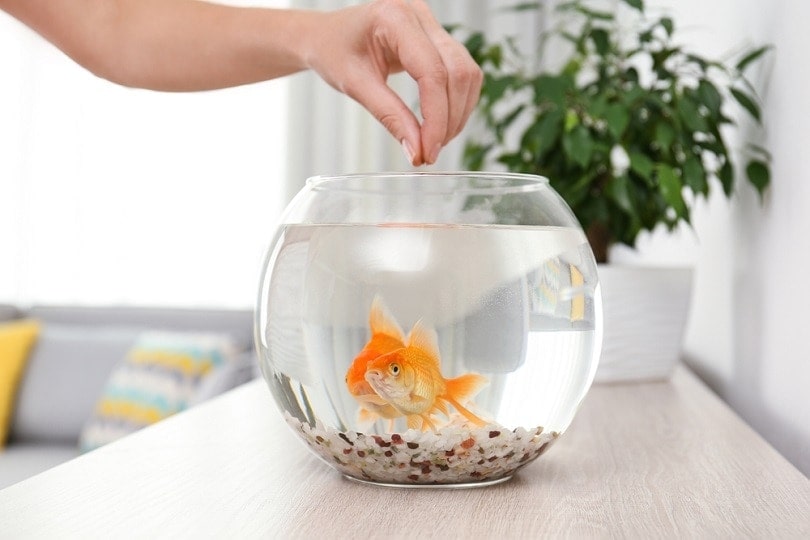
Obviously, it isn't enough to know when you should feed your fish, but how much should you feed a goldfish. Again, this is not a black-and-white answer either as it largely depends on the factors mentioned above. That said, in general and for normal circumstances, I recommend feeding no more than your fish can eat in a 30-second window of time.
This is assuming you are feeding them some kind of processed food such as flakes, pellets, or gel food.
The reason? Foods sold by manufacturers are quite rich. They contain all the nutrients a goldfish needs in a single daily ration. More than that on a regular basis, and you can start to run into issues. One common problem is swim bladder disorder, which affects many if not most fancy goldfish. Lots of rich food is hard for them to process and can lead to constipation or food impaction in the GI tract. Another issue (more common with lower quality foods) that can arise from feeding a large amount is fatty liver.
Again, if you are feeding more temporarily and are doing lots of water changes—this rule is flexible. This lower amount of processed food will keep your tank way cleaner. Of course, the rest of the time, your goldfish will feel hungry once those 30 seconds are up.
That's why it's important to provide foraging for them throughout the day (more on that later).
Many fish die as a result of improper food and/or portion sizes, which can be easily prevented by proper education.
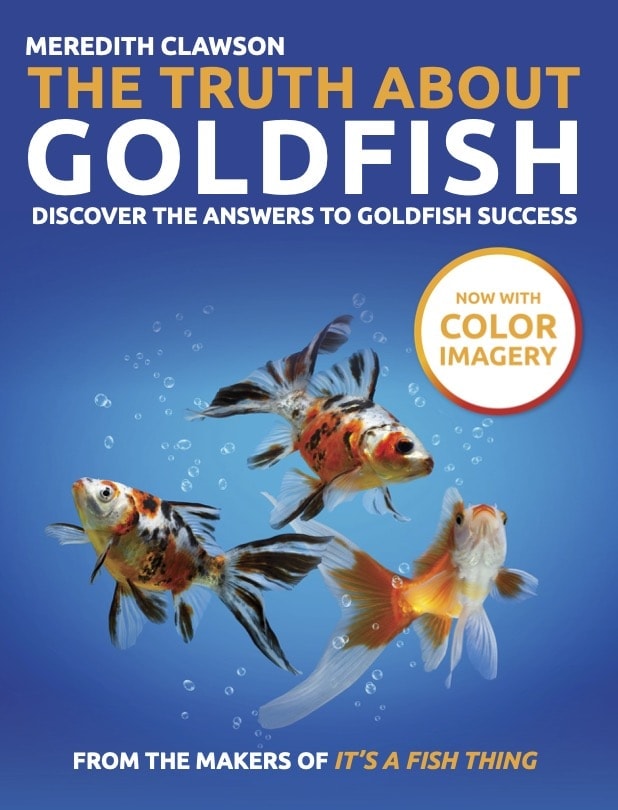
That's why our best-selling book, The Truth About Goldfish , covers exactly what you can and can't give your goldies when it comes to mealtime. It's even got a section dedicated to keeping your pet fish alive and well-fed when you go on vacation!
The Natural Diet of a Goldfish in the Wild
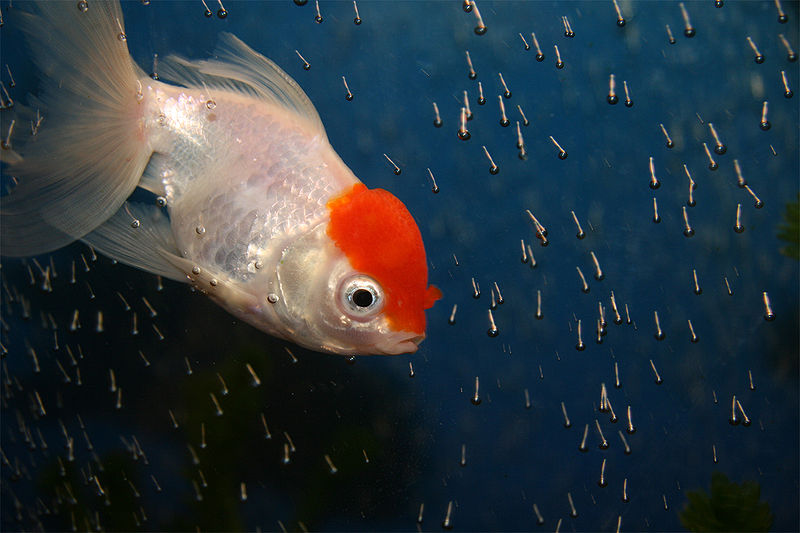
As you may know, the carp is the "granddaddy" of what we call goldfish. They may look REALLY DIFFERENT on the outside because of so much selective breeding that's been done to them…
…But they're still carp.
Understanding what they would eat if they still lived in the wild will help us know what we should feed them. This begs the question: what do carp eat? In the wild, carp aren't very good hunters, but their diet includes a mix of plants and insects or worms. They're omnivores.
Do your goldfish live in a pond like a carp? Then you don't have to worry about a lot of the issues we're going to talk about today. That's because the fish have lots to forage on already—just like the carp. On the other hand, if you have your goldfish inside, YOU are in charge of providing all of their nutrients. Just get these two things: a staple diet food and foraging supplements.
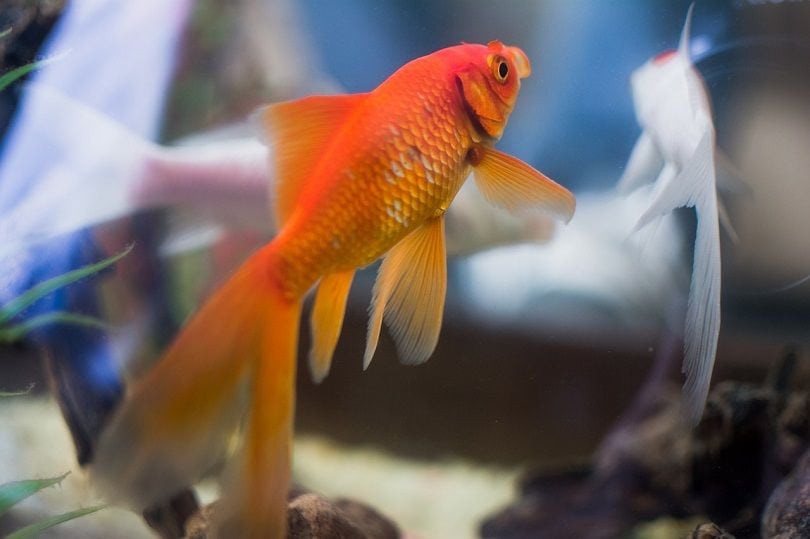

What do Goldfish Eat? Choosing a Good Quality Food for Your Fish
Be sure to pick them out a high-quality staple food to eat. This will supply the protein and fat the fish needs to live, as well as other important vitamins and minerals.
Let's get this out in the open right now: flakes are very popular. But I don't recommend them AT ALL. Why? They start falling apart and leaching ingredients into the tank as soon as they hit the water. And it's hard to tell exactly how much you're using.
If those aren't enough reasons to avoid them, there's also the fact that most of them use cheap, junkyfiller ingredients to cut down their costs! So what should you get instead?
1. Invest in a good quality staple diet food.
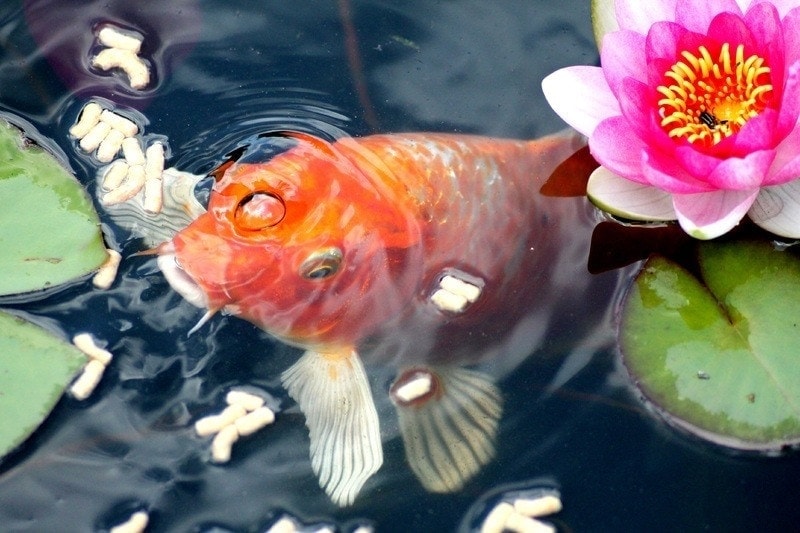
A good one will have better ingredients and a higher percentage of protein and fat. Plus, it is made to have all of the nutrients a goldfish will ever need for the rest of its life. If you have slim-bodied goldfish, like Commons or Comets, they aren't as prone to problems like constipation.
You still want to avoid low-quality foods (foods that aren't high in soy, corn, and starches) because they can foul your water and lead to health problems over time, but their diet doesn't need to be quite as strict as a fancy goldfish.
Fancy goldfish have modified bodies and are SUPER prone to swim bladder problems if their diet isn't just right. It should not contain any fillers, wheat or wheat gluten (goldfish aren't grain-eaters and don't digest wheat, which can cause swim bladder problems!), or chicken (protein should come from marine sources). Most of the common brands are literally junk food for your fish and don't meet all of these requirements, not even many of the ones marketed as "high-end" goldfish food brands.
Pellets offer the advantage of being easy to feed and store. You don't have to fuss with making up a new batch every week or two. You can also use pellets in an automatic feeder so you can just "set it and forget it" once every week or so. Great for us busy fish keepers.
Read more about pellets here.
There is another kind of goldfish food called gel food, which is fed to the fish in a wet form. Because it is moist, it helps minimize the risk of constipation which could be more of an issue with dry foods if they get impacted in the digestive tract.
Read more about why I like using gel food for my goldfish.
Gel food can also actually be made right in your own kitchen if you have the ingredients.
Remember, the food will only be as good as what you put in it. Goldfish have pretty complex nutrition needs, so you will have to do some homework and figure out everything you will need and how much of it to use.
Also, hate to burst your bubble, but you probably WON'T save money doing it this way. Like a good quality pellet would, it will need to have high protein and fat with little fiber. So, which is better—pellets, or gel food?
It depends on what works best for your unique fish and you, as the fish keeper. You might even try using both (like I do) and see which you prefer.
2. Fibrous veggies
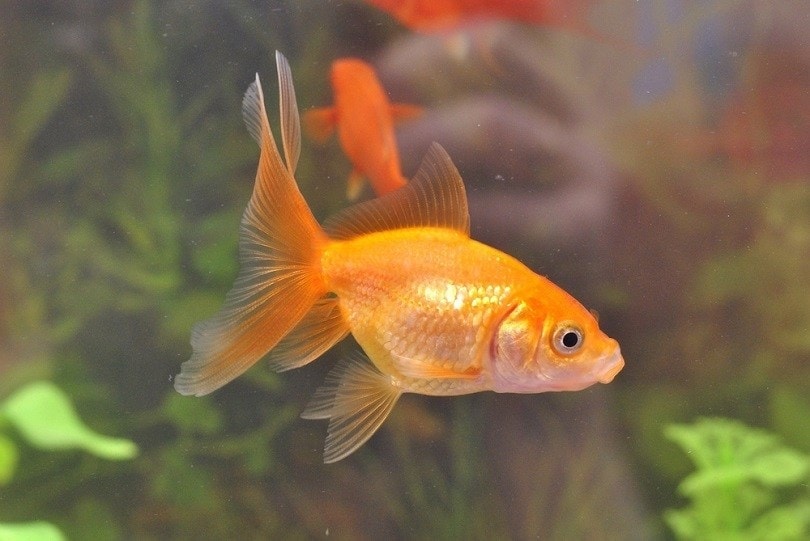
These will ensure that your goldfish gets the fiber it would get if it lived in the wild and counterbalance the rich pellets. There are a lot of options here. My personal recommendation is to get some leafy greens from your refrigerator for your goldfish to nibble on. You'll want to get enough of them (and maybe some different kinds) so they don't all get eaten up right off the bat.
Your goldfish DOES need to eat a daily salad!
3. Avoid the Pitfalls of Overfeeding
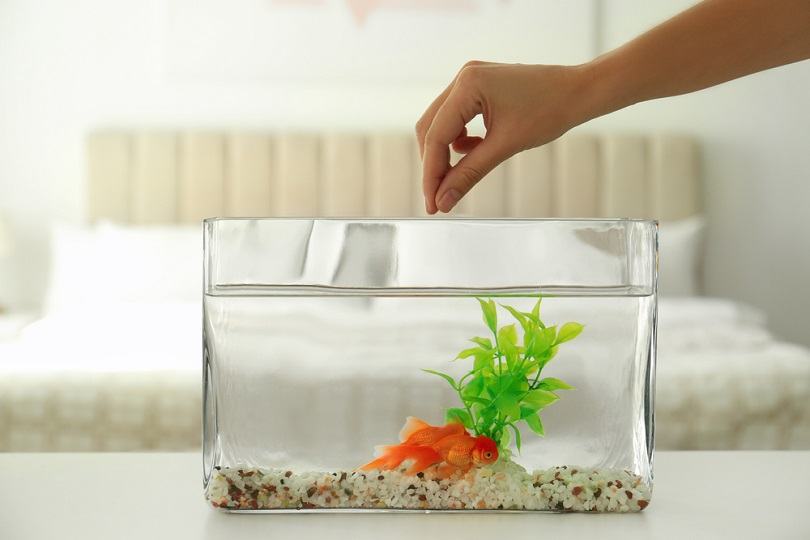
I think you'll agree with me when I say, eating a cheeseburger is GREAT every so often. But eating one every meal of your life—breakfast, lunch, and dinner?
Not so much.
You know the reason… it's too rich! Goldfish foods, even good quality foods, are rich like burgers. They're fatty and high in protein. Too much rich food = sick fish. While goldfish DO need some rich food to live, how much they eat of it has to be very controlled or they end up sick and overweight.
By nature, goldfish are foragers (like carp). They have only one goal in life: EAT—and eat as much as possible! This is because their survival instincts tell them to prepare fat reserves when food is available for the cold winter when food is scarce. It works well for carp who have those lean times, but not for goldfish who don't.
By now you know that goldfish are simply "repackaged" carp. All of these changes have made goldfish (especially the fancy kind) very sensitive with respect to diet. That's because their bodies have gotten much shorter… but their organs have not.
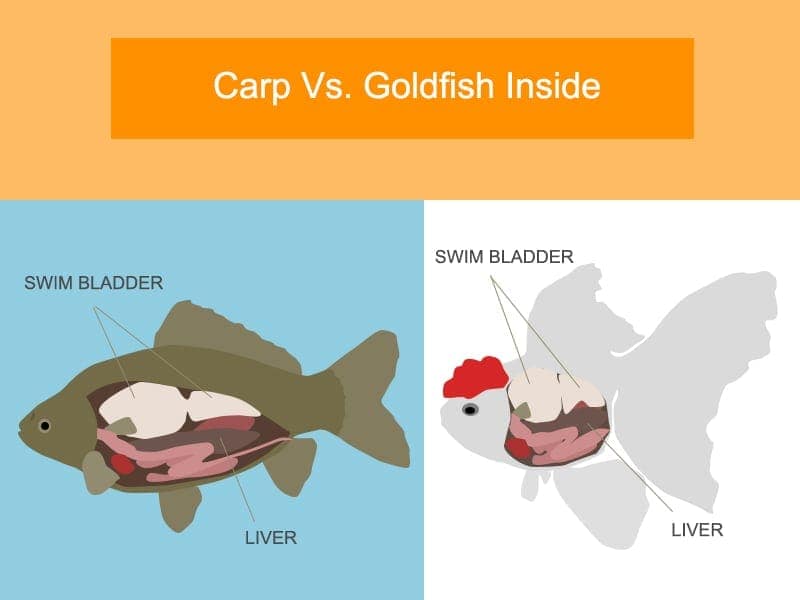
Their swim bladders and livers are especially prone to get damaged by eating too much FATTY FOOD. Fat builds up in and around their organs and can lead to problems with fluid balance… even to the point of getting the disease dropsy! That is… if you overfeed. This brings us to the next point:
Just how much of those pellets should you be giving your fish so they don't get overfed?
You may have heard this before: "Feed fish as much as much as they can consume in a 2-3 minute period several times daily." Or this: "Feed no more than your fish will consume in 5 minutes twice a day."
#facepalm
Those instructions will take your goldfish to bad health faster than a greased pig on roller skates in the average aquarium. See, unless you follow all of the best practices for goldfish care, you can't feed your fish that way. Because food is the biggest contributor to water quality problems. A time frame of about 30 seconds is all most goldfish keepers should be aiming to feed in. Any more than that… and you are actually risking your tank.
Want to know the scary part? Those directions actually came from labels on goldfish pellets from well-known pet stores! The average fish keeper reads them and thinks to themselves, "Perfect. My fish aren't overfed because I stay within those limits."
But not long after, they don't know why their fish are ill—maybe even dying. It doesn't take long to eat the amount of food a goldfish needs. Even though they don't need more nutrients, the rest of the day they will feel hungry. So they beg.

Seems glutinous, but actually they're BORED without being able to forage. (Instincts, remember?) Because they're not eating anything at that exact moment, they think they're starving when they aren't.
This is where the veggies come into play.
Leafy veggies like spinach or lettuce help balance out that rich food. And having 24/7 access to those healthy leafy greens will make sure your goldie always has something to munch on. But you should know, plants aren't nearly as tasty as pellets—they're a lot more tough and stringy—so your fish will be reluctant to eat them.
So here's a little goldfish parenting 101: If they aren't eating their salad, don't give them any pellets. (Eventually, they'll cave in!)
QUICK TIP:
Try freezing your veggies to soften them up before serving if your goldfish don't seem interested. That always does the trick for mine. Oh, and don't forget—you'll probably want to use a veggie clip. It will help keep the leaves from getting stuck on the filter—plus, you'll always know when it's time to refill. The magnetic kind lasts the longest and work well on both glass & acrylic tanks.

4. Get in the Habit of Following a Feeding Schedule
If you don't use an automatic fish food feeder, (which can be a nice time-saver) you'll probably want to pick a set time every day to feed so you won't forget to drop in the daily ration of pellets, gel food, or live food and make sure there are enough leafy greens in the tank. You can tell if they are if you see little bites out of the leaves and the amount is getting smaller, or by the color of their stool (it will be dark green).
How often do you feed goldfish? Adult goldfish should only be fed 1 time per day with high protein food. Smaller fish need more frequent feedings of little portions to grow big and strong.
They can still eat veggies around the clock, as much as they want, so you aren't depriving them. Feeding time is also a great time to check on your fish's general health.
People often overfeed because their fish acts like it is still hungry even after eating its pellets. It will do everything it can to look cute and irresistible to get you to buckle. Don't do it! You aren't being mean when you cap the jar and cross your arms. You're doing what's best for them. Remember… if it was up to your goldfish, it would eat itself to death.

A blimped-out, sick fish is far less adorable than a trim, healthy one—wouldn't you agree? Proper care (and good genetics) will make a fish look stout and healthy. If you have multiple fish, making sure that everyone gets their fair share can be a little tricky. That's why you could try hand feeding your goldfish.
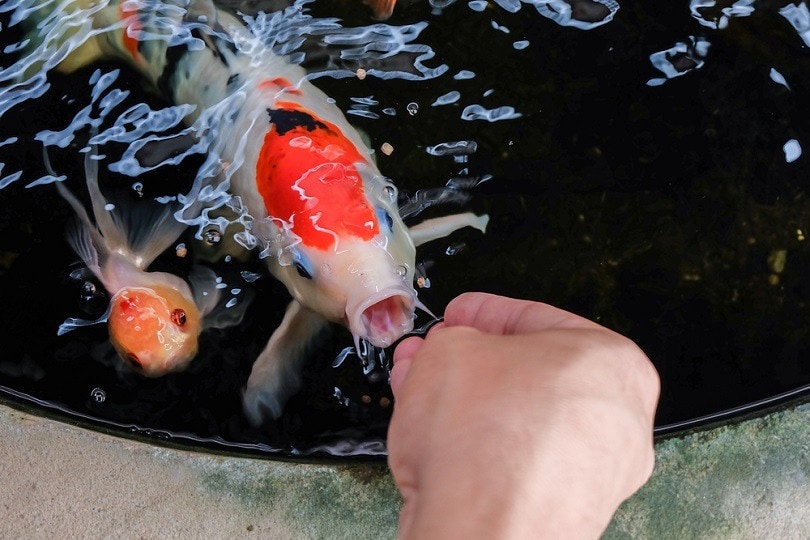
It makes it WAY EASIER to control who gets what during the feeding frenzy. You'll probably find that the time it takes to train your fish will depend on how clever it is. Newer fish will be more easily frightened of you, but don't give up. For the fish that just doesn't get it (or has poor vision, like a Telescope), you can try putting them in a floating basket while giving them food. There will be less room to search around and other fish won't interfere.
Just remember that if one fish happens to get more than the others some dinner, resist the urge to give the others more. Here's a helpful video on how to do it:

Now It's Your Turn
I hope this article has helped to shed some insight on answering the question, "how often should you feed goldfish"—as well as the reasons behind how often they need to eat. Now it's time to put those techniques into practice. If you don't remember anything else, remember that OVERFEEDING—not starving your goldfish to death—is the cause of most problems.
Did you learn something new? If so, I'd love to hear your feedback below.
Oh, before you go:
Finally, for the complete guide to goldfish care including everything you need to know about feeding, check out our book, The Truth About Goldfish.
Featured Image Credit: Kaikoro, Shutterstock
mcnicollknewhervel.blogspot.com
Source: https://www.hepper.com/how-often-to-feed-goldfish/
0 Response to "How Often to Feed a Black Goldfish"
Post a Comment